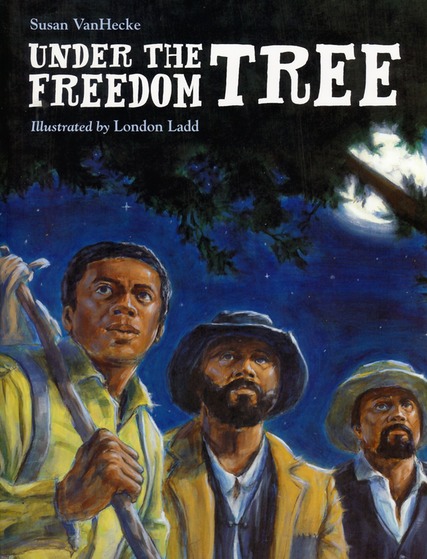Finding an unknown bit of history is fascinating to me, especially when I realize I have even a small personal connection to it. As a teenager, I spent several summers with my aunt and uncle at Fort Monroe, Virginia. One of my most vivid recollections was the way all traffic stopped, both automotive and pedestrian, at the sound of the five o'clock reveille bugle. If you were in a car, you stopped in the middle of the road, opened your door, got out and stood at attention (hand over your heart if you were a civillian like me) until the bugler's call was done. Then life went on as usual.
I recently read Susan Van Hecke's Under the Freedom Tree. It's a beautiful book, illustrated by London Ladd, published by Charlesbridge last year. Susan's lyrical picture book uses dramatic free verse to tell the story of three slaves who escaped a Confederate work team to cross the river to Fort Monroe. The author explains details of the story that couldn't be included in the short poem in her author's note. General Benjamin Butler, the Union commander, refused to return the three slaves to their Virginia masters because the state had seceeded from the Union just days before and declared them contraband of war. Others followed. Many others. They built the Grand Contraband Camp near what is today Hampton, Virginia. A missionary teacher, a free black from the North, came to the camp and taught the former slaves to read beneath a large, spreading oak tree. The celebration is contagious when a newly literate contraband reads the Emancipation Proclamation to the community.
An excerpt from the book:
Days are for Union work,
dragging,
hauling,
digging,
stacking.
Nights, they fall,
spent and hungry,
on cold dirt floors.
But here at Slabtown,
here at the Camp,
they are not
what they once were.
Matt Forest hosts the Poetry Friday Roundup at Radio, Rhythm & Rhyme.

